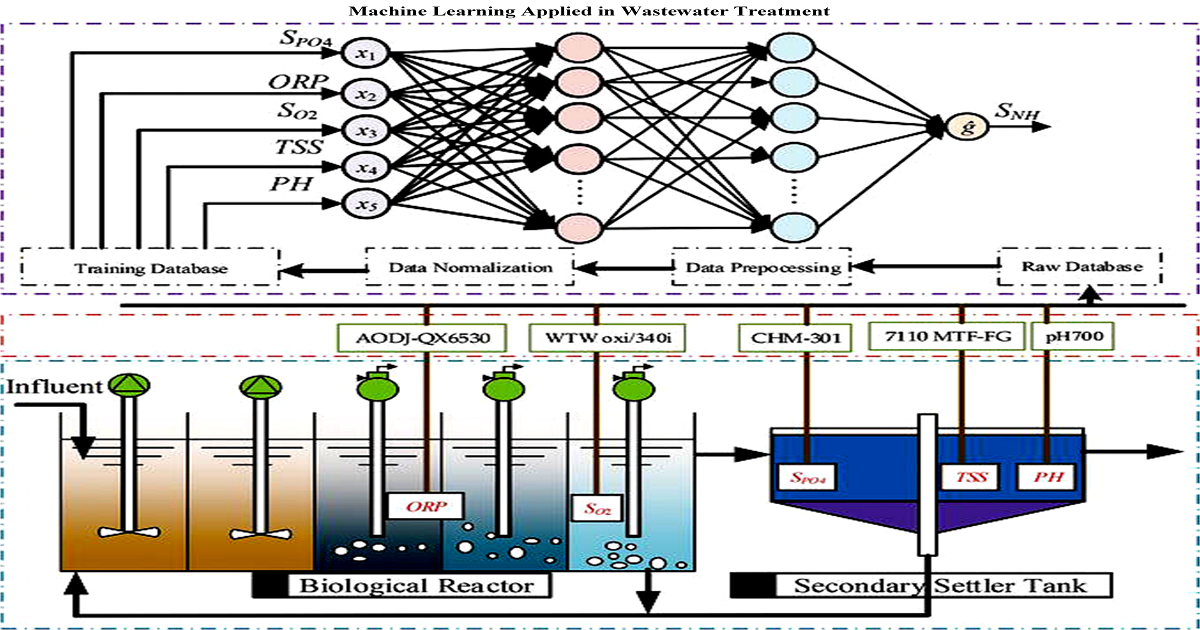Machine Learning Applied in Wastewater Treatment
A special issue of Processes (ISSN 2227-9717). This special issue belongs to the section "Environmental and Green Processes".
Deadline for manuscript submissions: 30 June 2024 | Viewed by 1065

Special Issue Editors
Interests: SCADA anammox WWTP; exergy analysis; design optimization and LNG process optimization; simulation-optimization framework developer
Interests: hydrogen; process systems engineering; hydrogen liquefaction; energy conversion and management; sustainability; cogeneration systems; machine learning
Special Issues, Collections and Topics in MDPI journals
Special Issue Information
Dear Colleagues,
Machine learning techniques can be applied in wastewater treatment to improve the efficiency, reliability, and cost effectiveness of the treatment process. Here are some ways in which machine learning can be applied in wastewater treatment:
- Prediction of Wastewater Characteristics: Machine learning algorithms can be used to predict the characteristics of incoming wastewater, such as its flow rate, chemical oxygen demand (COD), biological oxygen demand (BOD), and total suspended solids (TSS). These predictions can help operators adjust the treatment process in real time to optimize treatment efficiency and reduce costs.
- Fault Detection and Diagnosis: Machine learning algorithms can be used to detect and diagnose faults in the treatment process, such as equipment failures, clogs, or leaks. These algorithms can analyze data from sensors and other sources to identify patterns that indicate a problem and provide recommendations for corrective actions.
- Optimization of Treatment Process: Machine learning algorithms can be used to optimize the treatment process by adjusting the dosage of chemicals, aeration rate, and other parameters. This can help improve treatment efficiency, reduce energy consumption, and decrease the amount of chemicals used.
- Monitoring and Control of Treatment Plant: Machine learning algorithms can be used to monitor and control the treatment plant's operations in real time. This can help ensure that the treatment process is running smoothly and that all equipment is functioning correctly.
Overall, machine learning can play a significant role in improving the efficiency and effectiveness of wastewater treatment. By analyzing large amounts of data and providing real-time insights, machine learning algorithms can help operators make better decisions, optimize the treatment process, and reduce costs.
Dr. Alam Nawaz
Dr. Amjad Riaz
Guest Editors
Manuscript Submission Information
Manuscripts should be submitted online at www.mdpi.com by registering and logging in to this website. Once you are registered, click here to go to the submission form. Manuscripts can be submitted until the deadline. All submissions that pass pre-check are peer-reviewed. Accepted papers will be published continuously in the journal (as soon as accepted) and will be listed together on the special issue website. Research articles, review articles as well as short communications are invited. For planned papers, a title and short abstract (about 100 words) can be sent to the Editorial Office for announcement on this website.
Submitted manuscripts should not have been published previously, nor be under consideration for publication elsewhere (except conference proceedings papers). All manuscripts are thoroughly refereed through a single-blind peer-review process. A guide for authors and other relevant information for submission of manuscripts is available on the Instructions for Authors page. Processes is an international peer-reviewed open access monthly journal published by MDPI.
Please visit the Instructions for Authors page before submitting a manuscript. The Article Processing Charge (APC) for publication in this open access journal is 2400 CHF (Swiss Francs). Submitted papers should be well formatted and use good English. Authors may use MDPI's English editing service prior to publication or during author revisions.
Keywords
- predictive maintenance
- real-time control
- anomaly detection
- optimization
- fault detection and diagnosis
- wastewater treatment processes
- resource sustainability
- data analytics
- principal component analysis
- clustering






